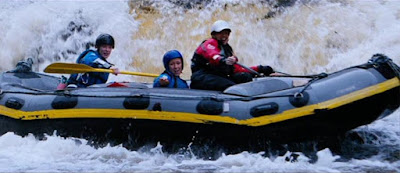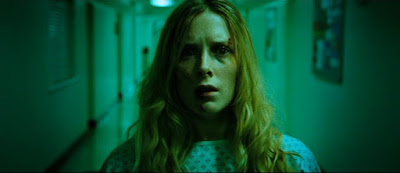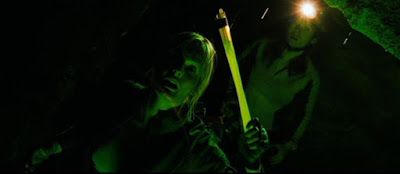(2005) Written and directed by Neil Marshall; Starring: Shauna
Macdonald, Natalie Mendoza, Alex Reid, Saskia Mulder, MyAnna Buring and Nora-Jane Noone; Available on Blu-ray
and DVD.
Rating: ****
“I love the ending. I think the ending poses a lot of
questions. Some people are gonna dislike it. What can you do? Some people want
things easily resolved, but I like the fact that people walk away with very
different ideas about what it means.” – Neil Marshall (from the DVD commentary)
Way back in the ‘80s, during my intrepid high school days, I
tried my hand at amateur spelunking. A friend told me about a particular cave
located in Simi Valley, California, which was rumored to be a hideout for the
Manson family. My curiosity and general lack of common sense compelled me to
ignore the warning signs about trespassing on private property, and accompany
my friend on an exploration of the isolated rocky chasm. The initial climb down
wasn’t so bad until I was forced to squirm down a constrictive tunnel on my
back, with a rock wall hanging mere inches above my face. At that moment, my
only thought was how unfortunate it would be for me if an earthquake occurred,
or if I suddenly became stuck. While getting in was no picnic, climbing out
proved to be even more problematic. Since you’re reading this now, however, I’m
sure you can ascertain it all worked out, although it’s an experience I don’t
care to repeat. With his Freudian nightmare, The Descent, writer/director Neill Marshall tapped into my deepest fears
about the subterranean darkness.
Marshall set out to create a movie that recalled his
favorite horror movies of the ‘70s and ‘80s. In the opening credits, he pays
homage to John Carpenter, by using the same font used in some of the filmmaker’s
most iconic movies, such as The Thing,
The Fog and Escape from New York. What follows is a relentless assault on the
psyche, as the tension gradually builds. With a combination of clever effects
and set design, Marshall and crew create a believable underground environment. CGI
is used sparingly, which augments the visuals, instead of calling attention to
the effects.
In the opening scene, Sarah (Shauna Macdonald) and her adventurous
friends enjoy a whitewater rafting excursion, while her husband and daughter observe
idly from the shore. The scene that follows is probably the most visceral and
jarring sequence in the movie, as we, the audience are complicit in Sarah’s
traumatic event. In the blink of an eye, her life is changed forever. Fast
forward a year, and Sarah is still grappling with her grief, and taking
antidepressants. She experiences recurring visions, where she relives the tragedy,
and dreams about celebrating her deceased daughter’s birthday. Sarah and the
audience remain on shaky ground, as we’re never quite sure which visions are
real, and which are in her mind.
The friends have assembled again, in North Carolina,* to
tackle another outdoor adventure. Led by their gung-ho companion Juno (Natalie
Mendoza), they venture into what turns out to be an uncharted cave. The
explorers learn too late that Juno’s self-aggrandizing ambitions might have led
them to ruin. After a tunnel collapses, they’re left with no choice but to move
forward, with the hope that they can find an exit. As tempers flare, and one
friend suffers a particularly nasty compound fracture, they begin to question
if escape is possible. To make matters worse, as they forge deeper into the cave,
they discover they’re not alone. Lurking in the hidden crevices are blind,
cave-dwelling bipeds with a taste for human flesh. The creatures navigate the
tunnels using echolocation, in the form of unnerving clicking sounds.
* Fun fact: The Scottish countryside stood in for the
Appalachian Mountain region depicted in the film.
As with any quality horror film, The Descent is open to multiple interpretations. To borrow a page
from Sigmund Freud, it balances manifest (what’s on the surface) and latent (underneath
the surface) elements. The darkness of the cave (the film was originally titled
The Dark) becomes a milieu for our
deepest-seated fears and anxieties. It was suggested to me that the film was a
female version of Deliverance (minus
the hillbilly rape), with its themes of people against nature, and a clash of
societies. It’s easy to draw numerous parallels with the characters and
situations (replace outdoorsy Juno with the survivalist Lewis, played by Burt
Reynolds). It doesn’t take an expert in psychoanalysis to decode the overt
symbolism of the cave, as the bloodied characters squeeze through the cave’s
restricted confines, in a perverse mimicry of childbirth. The most compelling
(and plausible) theory, however, suggests the film’s events are fabrications of
Sarah’s mind, and the proverbial descent is her plunge into madness.
Of course, we can take many of these interpretations with a
grain of salt when we consider Neil Marshall wanted to create something that
would scare the crap out of us, and succeeded in spades. The Descent remains his most accomplished effort to date, and one
of the best pure horror films in the past decade. It holds up, whether one
takes a literal stance or looks for something deeper (pardon the obvious pun).
Grown up me, if there is such a beast, enjoys entertaining these numerous
theories, but six-year-old me just wants to see some monsters. At the end of
the day, both go home satisfied.








Time for a re-watch! Just watched Dog Soldiers recently and I am in the mood for another Marshall flick soon. (looking forward to his Bad Seed entry in Tales of Halloween), Glad to see someone picking up on those title fonts! Nice write up, Barry. Keep it up!
ReplyDeleteThanks, Vic! I can't wait to see Tales of Halloween.
Delete